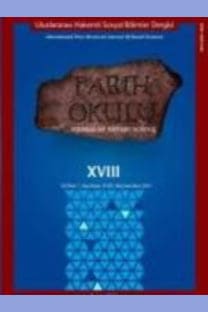SOVYET SOSYALİST CUMHURİYETLER BİRLİĞİ'NDE (SSCB) DÜŞÜNCE HAREKETLERİNİN EDEBİ ESERLER ÜZERİNDE ETKİSİ: SSCB'DE ÇEVİRİ SANSÜRÜ
The Effects of the Movement of Thoughts on Literary Works in Union of Soviet Socialist Republics (Ussr): Translation and Censorship in Ussr
___
- EGLÂJA-KRISTSONE Eva, "Filtered Through The Iron Curtain: Soviet Methodology for the Canon of World (Foreign) Literature and Latvian Case", University of Tartu Press, c.XVII, yıl: 2012, 04 Aralık 2015, http://ojs.utlib.ee/index.php/IL/article/view/IL.2012.17.27.
- GÜRKAN Ülker, "S.S.C.B. Siyasi Rejimi'nin Ana Hatları", Ankara Üniversitesi Hukuk Fakültesi Dergisi, c.XXI/I, dönem: 1964, 03 Kasım 2015, http://dergiler.ankara.edu.tr/dergiler/38/338/3464.pdf.
- HASANOĞLU İbrahim, Homo Sovieticus: "SSCB'de Sovyet Halkı İnşası Çabaları", Turkish Studies, c. X/I, dönem: Kış 2015, 07 Aralık 2015, http://www.turkishstudies.net/DergiTamDetay.aspx?ID=7543.
- HEMMER Jeff, Language Policy, language practice and language attitudes in the early Soviet Union, 02 Aralık 2015, http://www.cultiv.net/cultranet/1129718901languagepolicypracticeattitudes_e arlysovietunion.pdf.
- INGGS Judith, "Translation and Transformation: English-Language Children's Literature in (Soviet) Russian Guise", International Research in Children's Literature, c.VIII/I, dönem: Temmuz 2015, 03 Aralık 2015 http://www.euppublishing.com/doi/10.3366/ircl.2015.0145.
- KOMISSAROV Vilen N., "Russian Translation Tradition", Routledge Encyclopedia of Translation Studies (ed. Mona Baker), Routledge, Londra, 1998, s. 545-546.
- ODACIOĞLU Mehmet Cem, ve KÖKTÜRK Şaban, ""Rudyard Kipling'in "If" Adlı Şiiri ve Türkçeye Bülent Ecevit Tarafından "Adam Olmak" Başlığıyla Aktarılan Çevirisinin Andre Lefevere'nin Yaklaşımı Doğrultusunda İdeolojik Bir Değerlendirmesi", Sakarya Üniversitesi, Fen Edebiyat Dergisi, 2013, Cilt. 15 ,s. 191-209.
- V. Yu. Rozentveig, The Work on Machine Translation in the Soviet Union, 4.International Congress of Slavicist Reports, Mechanical Translation, c.V/III, dönem: 1958 Eylül, 01 Aralık 2015, http://www.mt-archive.info/MT- 1958-Rozentsveig.pdf.
- LENIN Viladimir I., "Is a Compulsory Official Language Needed?", Lenin Collected Works, Progress Publishers, 1972, Moskova, c. XX, s. 71-73, 07 Aralık 2015, https://www.marxists.org/archive/lenin/works/1914/jan/18.htm.
- ÖZEL Merve Suna, "Stalin Dönemi Rus Milliyetçiliği ve Politikaları", Kırıkkale Üniversitesi Sosyal Bilimler Dergisi, c.IV/II, dönem: 2014 Temmuz, 05 Kasım 2015, http://dergipark.ulakbim.gov.tr/kusbd/article/view/5000112750.
- PAMIR DIETRICH Ayşe, "Language Policy and the Status of Russian in the Soviet Union and the Successor States outside the Russian Federation", ASEES, c.XIX/I-II, yıl:2005, 01 Aralık 2015, http://miskinhill.com.au/journals/asees/19:1-2/language-policy-status-ofrussian.pdf.
- SHERRY Samantha, "Censorship in Translation in the Soviet Union in the Stalin and Khrushchev Eras", University of Edinburgh, Birleşik Krallık, 2012, s. 50, (Doktora Tezi), 07 Aralık 2015, https://www.era.lib.ed.ac.uk/handle/1842/7586. "Translating Classics in the Soviet Union": the ABDEM Group, 08 Aralık 2015 http://www.colbud.hu/gnothi/rm/papers/Budaragina_web.docs.
- UYGUR Erdoğan, "Sosyalist Realizm Kavramının Ortaya Çıkış Süreci", Türkiye Sosyal Araştırmalar Dergisi-Turkish Journal of Social Research, c. IX/I-II, dönem: Nisan-Ağustos 2005, 03 Kasım 2015, http://turkoloji.cu.edu.tr/GENEL/erdogan_uygur_realizm.pdf.
- VID Natalija, "Use of Domesticated and Foreignized Methods in the Soviet School of Translation", Ljubljana University Press, c.IV/I-II, yıl.2007, 21 Kasım 2015, http://revije.ff.uni-lj.si/elope/article/view/333.1.
- ISSN: 1308-5298
- Yayın Aralığı: 6
- Başlangıç: 2008
- Yayıncı: Ahmet KARA
OSMANLI'DA KADINA ŞİDDET-GALATA ÖRNEĞİ
G. Sahetov, (1928), Milli Medeniyet Hakkında, Aşkabat: Türkmenistan Devlet Neşriyatı, 150 s.
GEÇMİŞTEN GÜNÜMÜZE ÇİFTELER İLÇESİNDE GÖÇLER
1925-1945 YILLARI ARASINDA DOĞU VE GÜNEYDOĞU ANADOLU BÖLGESİ’NDE İDARİ DÜZENLEMELER
BASIN-YAYIN VE TURİZM GENEL MÜDÜRLÜĞÜ DÖNEMİNDE TÜRKİYE’DE TURİSTİK KONAKLAMA FAALİYETLERİ
ORTAÇAĞ ERMENİ LİTERATÜRÜNDE HZ. MUHAMMED ALGISI
II. MEŞRUTİYET DÖNEMİ FİKİR AKIMLARINDA KADIN VE EVLİLİK TARTIŞMALARI
TARİH DERS KİTAPLARINDA KADIN HATIRATLARININ KULLANILMASI
XIX. YÜZYILIN İLK YARISINDA YOZGAT’IN SOSYO-EKONOMİK VE DEMOGRAFİK YAPISI
